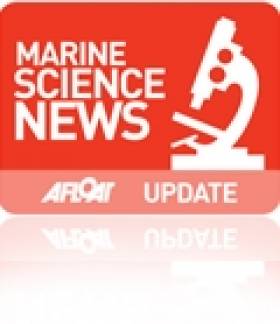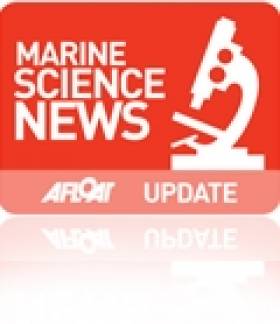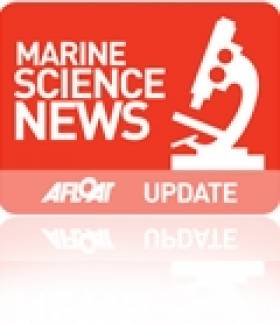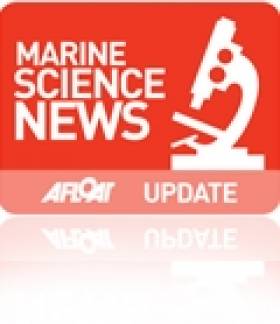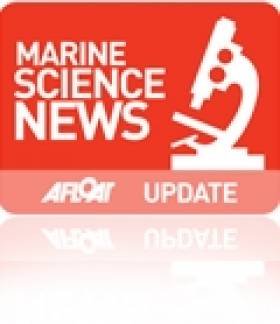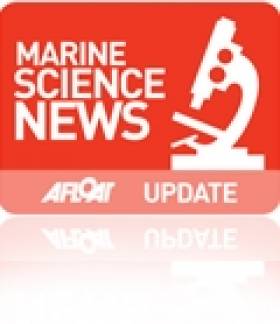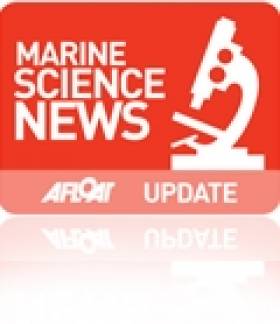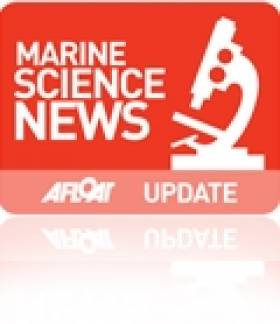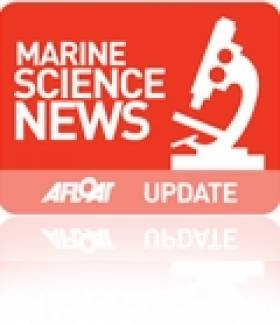Displaying items by tag: RV Celtic Explorer
Celtic Explorer To Head Out On Spanish Expedition
#MarineScience - Marine scientists from four countries will set off from Galway tomorrow on a three-week expedition to explore the deep ocean off southern Spain.
As Galway Bay FM reports, the 13 experts will voyage on the RV Celtic Explorer to investigate the likes of "mud volcanoes, sponge gardens and cold-water corals" up to a mile below the surface.
It's only a few months after the same vessel took an international team to map undersea mountains on the Atlantic seabed off eastern Canada.
#SeaforSociety - An open day saw more than 150 children from five schools from Dublin, Cork, Galway, and Mayo visit the Marine Institute's research vessel, the RV Celtic Explorer, as well as Galway Atlantaquaria, as part of the EU FP7 Sea for Society project to raise awareness of our ocean, this week in Galway city.
The Sea for Society collective action aims to shape the concept of a "Blue Society" and improve Europe's understanding on the relation between the ocean and our daily life activities. "As part of the Sea for Society FP7 project in Ireland, we provided the opportunity for children to see and take part in a wide range of activities including meeting with marine scientists, researchers and the Captain of the RV Celtic Explorer, as well as the team from AquaTT and marine experts at the aquarium," explained Cushla Dromgool-Regan, Marine Institute.
On the vessel the children meet with the fisheries research team who showed a wide range of fish from the deep ocean. The seabed mapping researchers showed bathymetry mapping images of key shipwrecks around Ireland as well as the newly discovered submarine mountain ranges mapped by the RV Celtic Explorer on its latest expedition from Newfoundland to Galway.
The remotely operated vehicle ROV Holland I, which is to be used in the vessels next expedition filming cold water corals on the Porcupine bank, was also on display. This
provided a key opportunity for the children to learn about marine history, marine technology well as taking part in some simple experiments demonstrating pressure.
AquaTT also asked the teachers and children to think about the small changes we can make in our lifestyle which have a significant impact on the ocean, such as using less water, eating fish that has been caught sustainably, disposing plastics in a responsible way, to taking part in beach cleans.
Galway Atlantaquaria provided tactile learning opportunities where the students got to touch and see marine animals native to Irish seashores and ocean.
Teachers and pupils alike described the event as a unique and wonderful experience. "I've attended many trips with the school, but this one really stood out. We learned so much, ranging from how phytoplankton in our ocean provide up to 50 percent of the oxygen we breathe, to how to tell the age of a fish using their ear bones - otoliths. Raising awareness of our ocean and the impact that the ocean has on us is so important," said Maire Ni Fhoghlu, from Gaelscoil Uileog de Burca, Claremorris.
The children who attended the open day had taken part in the Marine Institute's Explorers Education Programme which is run by Galway Atlantaquaria, Blackrock Education Centre, SeaLife – Bray and Lifetime Lab in Cork, and is also supported by other education centres in Mayo and Galway.
"The excellent marine activities and projects completed this year by the schools were evident by the enthusiasm and knowledge of the children who visited the Celtic Explorer. For an island nation it is heartening to see that the children are learning about our ocean, understanding the importance of scientific marine research as well as taking personal responsibility for caring for our marine environment," Cushla Dromgool-Regan further said.
The Explorers Education programme also provides a range of cross curricular teaching resources and lesson plans for all primary schools to freely download at www.explorers.ie
In addition for more details on the programme details click HERE.
Scientific Transatlantic Mapping Between Ireland & Canada Begins
#mapping – The Minister for Agriculture, Food and the Marine, Simon Coveney TD today joined with Carlos Moedas, European Commissioner for Research, Science and Innovation, and Karmenu Vella, Commissioner for Environment, Maritime Affairs and Fisheries in Brussels, along with Canada's Minister of Fisheries and Oceans Gail Shea, to announce the first trans-Atlantic mapping survey to take place under the Atlantic Ocean Research Alliance.
The Irish research vessel, RV Celtic Explorer will undertake a mapping expedition between St. John's, Newfoundland, Canada and Galway in Ireland in June of this year, as scientists from the Marine Institute, Ireland will be joined by a multi-national team made up of USA, Canadian and European ocean mapping experts. This is an important step following the agreement reached at Galway in May 2013 and is an example of scientific diplomacy in action.
Speaking from Brussels, Minister Coveney said "Information from the sea-floor is vital to the sustainable management of the Atlantic as well as to important industries such as fisheries, aquaculture and tourism. Ireland has developed a world-leading reputation for sea-bed mapping and is also very committed to the implementation of the Galway Statement and so I am delighted to put at the disposal of the team, Ireland' state-of the art research vessel-RV Celtic Explorer."
Commissioner Moedas stated "I am committed to harnessing the societal and economic value of our oceans, while protecting fragile marine ecosystems. Under Horizon 2020 we have invested just under €70 million to support the Galway Statement follow-up. The first calls delivered excellent project proposals involving international teams. I am glad that this investment is being leveraged to make our transatlantic vision a reality."
Commissioner Vella welcomed the announcement, stating. "One of the priorities of my mandate is Ocean Governance. Our wish is that the EU continues to be fully engaged on this subject. The sea-bed mapping expedition announced today illustrates the EU's capacity as a global leader and partner. The 'Celtic Explorer's' mission across the north Atlantic will be undertaken by crew from 'both sides of the pond'. This embodies the spirit of cooperation that we need in the field of Ocean Governance. Their work will help inform the mapping of the European seabed, which is set to be completed by 2020. I congratulate all those involved".
Welcoming the initiative, the Honourable Gail Shea, Canada's Minister of Fisheries and Oceans said "Canada recognizes the importance and complexity of Atlantic Ocean science. Our nations' cooperation is key to broadening our scientific understanding of the Atlantic Ocean and helping to ensure it remains healthy, resilient and productive. This is why our scientists are collaborating through the Galway Statement to pool resources, share expertise and advance our science goals."
The announcement was made at the European Commission hosted event, 'The Atlantic- Our Shared resource. Making the Vision Reality' which was a follow up to the May 2013 signing of the Galway Statement on Atlantic Ocean Research Cooperation between the EU, Canada and the United States of America.
This event is the launch pad for all the Galway Statement follow-up projects funded with the first Horizon 2020 Blue Growth calls - the main financial instrument on the EU side implementing the Galway Statement commitments.
With a view to translating commitments into investments, the European Commission has earmarked around € 70 million in calls under Horizon 2020, the EU Research and Innovation Programme for the period 2014-2015.
Background:
The Galway Statement – The Atlantic Ocean Research Alliance
In May 2013, an Atlantic Ocean Research Alliance between Canada, the European Union and the United States of America was launched in Galway, Ireland, with the high level signature of the Galway Statement on Atlantic Ocean Cooperation.
The goals are to join forces to better understand the North Atlantic Ocean and to promote the sustainable management of its resources. Together we can build a capacity to understand and predict major Atlantic and Arctic processes, as well as the changes and risks they carry in relation to human activities and climate change.
The Galway Statement contributes to the implementation of the EU's Atlantic Strategy and its related Atlantic Action Plan. The Action Plan considers responses to the challenges of delivering growth, reducing the carbon footprint, using the sea's natural resources sustainably, responding effectively to threats and emergencies and implementing an "ecosystem" management approach in Atlantic waters.
The lead on the side of the Commission for the Ocean Research Alliance lies with DG RTD – the Directorate-General for Research and Innovation, in close coordination with DG MARE -the Directorate General for Maritime Affairs and Fisheries, which leads on the overall Atlantic Strategy.
Areas identified for cooperation under the agreement include:
· Ocean Stressors (e.g. ocean acidification)
· Aquaculture
· Interoperability and coordination of observing systems and infrastructures, including vessels
· Seabed and benthic habitat mapping
· Marine Microbial Ecology and
· Ocean Literacy
A series of regular Stakeholder Meetings to operationalise the Galway Statement started in Brussels in April and June 2014 with high level participation from Europe, US and Canada, bringing together a variety of existing networks already active on both sides of the Atlantic. Other Stakeholder Meetings were organised in 2014 in Washington D.C. and Ottawa. In December 2014 the first seabed mapping event took place in Dublin (Ireland), which was followed by another meeting in February 2015 in Brussels.
The Atlantic Ocean Research Alliance has been recognised as an example of how we can join efforts in research and innovation in the Joint Statement of the EU-US Summit on 26 March 2014, during President Obama's visit to Brussels. Also, the importance of this initiative was acknowledged in the EU-Canada Summit Declaration from September 2014, as a contribution to the strategic partnership in the field of research and innovation.
Since the signature of the Galway Statement, the expansion of this cooperation to the Southern part of the Atlantic, particularly towards Brazil and South Africa, has been evoked regularly. Brazilian and South African partners have been invited to several Atlantic Ocean Alliance events.
The event "The Atlantic – our Shared Resource: Making the Vision Reality" to launch research projects which constitute a clear follow-up of the Galway Statement and which were selected under the first Blue Growth call for proposals of Horizon 2020, takes place on 16-17 April 2015 in Brussels. Representatives from Brazil and South Africa are partners in some projects and will join representatives from Europe, the US and Canada in order to celebrate the translation of the political commitments taken in Galway into real investments which will boost the Atlantic Ocean Research Cooperation initiative.
#deepsea – An international research team, led by scientists from NUI Galway, is currently exploring the Whittard Canyon deep-sea submarine canyon system in the North East Atlantic onboard the Marine Institute's RV Celtic Explorer.
Researchers from Ireland, the UK, the USA and Germany are using the Institute's ROV Holland I to study the diversity of deep-water animals and relate this to geology and ocean currents.
The Whittard Canyon system is at the continental margin approximately 250 miles SW of Cork, covers an area of 2000 square miles, and is home to vulnerable marine ecosystems of cold-water corals, deep-water oysters and file clams. But new research is also revealing a remarkable diversity and abundance of rare black corals, which are protected under international legislation.
"The extreme shape of submarine canyons seems to affect the water flow within them in such a way as to deliver nutrient rich waters to particular parts of the canyon system. This allows diverse ecosystems to flourish. Our research is attempting to understand these processes so that we can predict where the most vulnerable ecosystems are likely to occur and therefore ensure the environment is protected," explained Dr Martin White of NUI Galway's Ryan Institute, and the expedition's chief scientist.
According to Dr Louise Allcock, also of NUI Galway's Ryan Institute, "Black corals are particularly vulnerable to any sort of impact. They grow extremely slowly and dating studies have shown that some species live for thousands of years."
The Whittard Canyon system is huge, with meandering branches extending over an area of more than 80 by 20 miles. Mapping the system, much of which is in depths below 1500m, to detect vulnerable species is difficult. Therefore the team hopes that the new data will reveal the factors that determine which species occur where.
ROV Holland I provides a way of sampling deep-sea animals without impacting the ecosystem. The team is also providing deep-sea sponge samples to scientists searching for novel pharmaceutical compounds. If the chemists find interesting compounds such as antibacterial and other pharmaceutical properties in the sponges, they will aim to work out how to synthesize them in the laboratory. This is the first step in the production of new drugs.
The scientists are blogging about their experiences and discoveries aboard RV Celtic Explorer throughout the survey (June 6th – 21st) on the blog scientistsatsea.blogspot.ie and on twitter via the hashtag #ce14009
The research survey is carried out under the Sea Change strategy with the support of the Marine Institute, funded under the Marine Research Sub-Programme by the Irish Government.
Irish–Newfoundland Transatlantic Research on RV Celtic Explorer
#marinescience – The RV Celtic Explorer leaves Galway today (12th April) for Newfoundland and Labrador, on its fourth multi-institution transatlantic survey. The 13 day expedition across the Atlantic to St Johns, Newfoundland will involve four scientists from NUI Galway, as well students from UCC and GMIT. A team of six of scientists lead by Dr. George Rose from the Fisheries and Marine Institute of Memorial University, Newfoundland, will work alongside nine Irish scientists during the voyage.
The collaboration with Newfoundland and Labrador builds on the strong relationship established since the first Newfoundland survey on the Celtic Explorer in 2011.
"Such cooperation is key to improving our ocean wealth and promoting the sustainable management of its resources. It's hugely important for Ireland and brings us closer to achieving the goals of the 'Galway Statement on Atlantic Ocean Cooperation' signed here at the Marine Institute Galway last May by the EU, USA and Canada ", said Dr. Peter Heffernan, CEO Marine Institute.
Irish scientists onboard will study the rich and diverse pelagic ecosystem across the Atlantic Ocean. "Marine scientists from NUI Galway will study the oceanography and the deep scattering acoustic layers of the water columns using multi-frequency acoustics. This is then related to zooplankton abundance and ultimately to fish abundance, providing us with a better understanding of the ecosystem," explained Dr. Louise Allcock from NUI Galway.
Scientists from Galway Mayo Institute of Technology will study plastics found in the ocean. Micro-plastic debris is made up of tiny plastic granules, fibres and fragments less than 5mm in diameter. Although plastics are beneficial materials, micro-plastics appear to be pervasive in the ocean and scientists do not yet fully understand the impact that small plastic particles can have on the food chain. Ingesting the tiny particles may be toxic to the animals, and may prevent them from consuming their natural prey.
"We hope this research will help to raise awareness of the effects of plastics in the ocean and provide better ecosystem assessments across the Atlantic," said Ms Amy Lusher from Galway Mayo Institute of Technology who is completing a PhD on this topic.
Seabird and marine mammal observations will also be conducted by Aoife Foley from Galway Mayo Institute of Technology and Ashley Benison from University College Cork. These animals are considered top predators in the pelagic environment and the abundance of fish and zooplankton, their prey, ultimately affects their distribution and survival.
The Newfoundland team of scientists will continue their strong collaboration with the Irish scientists. "This collaboration is now into its 4th year with a major paper based on linking acoustic, biological and oceanographic data from 2011-2013 presented at the recent international Marine Science Conference in Hawaii," explained Dr Rose.
Sharing information and experiences with scientists from both sides of the Atlantic allows Irish researchers to forge strong links with our Newfoundland and Labrador – Canadian counterparts.
"Being the western and eastern bookends of the North Atlantic, and given our shared history, it seems only right that Newfoundland and Ireland scientists should work together on problems of mutual interest, and this has indeed proven to be very enjoyable and highly productive" Dr. Rose further stated.
New Call For Ship Time On Irish Research Vessels
#MarineScience - The Marine Institute has announced an additional call for funded ship time on the RV Celtic Explorer and the RV Celtic Voyager.
Applications are invited from research performing organisations including higher education institutions, public research bodies and industry to carry out ship-based research activity.
The areas of research may relate to: ecosystems approach to marine resource management; seabed processes and resources; climate/environmental change; renewable ocean energy; biodiscovery/biodiversity; novel marine technologies; and marine policy/legislati
Applications from early stage researchers, including PhD students or early post-doctoral researchers, are particularly encouraged to apply, to allow emerging marine scientists the opportunity to gain hands-on experience in undertaking ship-based research.
Applications will only be accepted for a limited number of days - one week in September 2014 on the RV Celtic Explorer, and up to three weeks with available dates in July, September, October and December 2014 on the RV Celtic Voyager.
The closing date for receipt of applications is 3pm on Thursday 17 April 2014. Applications must be submitted using the Research Vessel Operations' online Survey Planning System (SPS) and Research Information Management System (RIMS), which are available on www.marine.ie. (Please contact the Research Vessel Operations team at [email protected] to obtain a password for SPS.)
The Vessel Charter Guidelines 2014-1015 (Word doc 253KB) should be read carefully before submitting the Ship-Time Application Form.
Applicants may seek grant-aid to cover all or part of the vessel charter costs for research surveys. For information on eligibility for grant-aid and how to apply, read National Research Vessels 2014 Ship-Time Programme Grant Aid Guidelines (PDF 577KB).
Schools Essay Contest For Celtic Explorer Visit
#MarineScience - The Marine Institute invites fifth and sixth class primary school pupils to take part in Exploring the XTRA-Ordinary, a new writing competition where the winner and their class will be invited to visit Ireland’s national maritime research vessel Celtic Explorer in Galway in early December.
Students are asked to get creative and write a poem about the XTRA-Ordinary exploration on the RV Celtic Explorer and demonstrate their understanding of Ireland’s marine life and ocean.
The winner and their class will be given a tour on board the RV Celtic Explorer and get to meet the crew and scientists that work on board, as well as see the Remotely Operated Vehicle Holland 1.
Students will also get the opportunity to visit the Dry Lab, where scientists collect data from the ocean that is used to produce maps of Ireland’s seabed, and the Wet Lab where scientists collect marine samples and research marine species that live in the ocean.
A short-list of the entries will be displayed and winners will be announced at the 2013 Galway Science and Technology Festival that takes place at NUI Galway on 24 November from 10am to 6pm.
Entries must be sent to Cushla Dromgool-Regan, The RV Celtic Explorer’s XTRA-Ordinary Writing Competition, Communications Office, The Marine Institute, Rinville, Oranmore, Co Galway. The closing date for entries is Thursday 21 November 2013.
For more information about the competition see HERE. And teachers can find lesson plans about poetry, images and footage of marine species and habitats and the activities of the RV Celtic Explorer on the Marine Institute website HERE.
In other schools news, Ayr Hill National School in Ramelton, Co Donegal took the top honour in the 'Something Fishy' education programme for 2013.
Students and staff from the school visited the Donegal Education Centre on Friday 25 October to receive their national award – won in the last two years by schools in Co Wexford - for their class project on the River Leannan and the threat posed to it by invasive species.
At the award ceremony, Ayr Hill principal Hilary McNutt was presented with the perpetual trophy by Inland Fisheries Ireland chief Dr Ciaran Byrne and a class trophy from the IFI board chair Brendan O’Mahony.
Donegal GAA player Mark McHugh was also on hand to add his congratulations and present each student with an individual ‘goodie bag’.
McNutt praised the work of her pupils, the Education Centre and IFI staff Owen Kelly and Paul Burke, whose interest and passion for their work enthused and engaged the children with the project.
The River Leannan project involved preparatory class work and the pupils visiting eight sites along the river from source to sea taking physical readings as well as looking at land use, flora and fauna and in particular watching out for ‘alien species'.
#MarineScience - The RV Celtic Explorer is nearly a week into its Celtic Sea Herring Survey for 2013 with a wide variety of marine wildlife sightings already on record.
Some 15 scientists comprise the crew of the research vessel for the 3,200-nautical-mile voyage, including eight members of the core acoustic and biological team, plus four seabird observers, one marine mammal observer, one observer from the fishing industry and a PhD student in environmental microplastics.
The boat's first day at sea saw the crew treated to the sight of more than 50 common dolphins around the Blasket Islands and Dingle Bay, which also boasts an important concentration of seabird species such as sooty shearwaters, guillemots and storm petrels.
The latter, also known as 'stormies', are one of the hardiest bird species, especially for their tiny size - many living for up to 30 years despite the challenging conditions the face far out to sea on their migratory path to south-west Africa.
But herring stocks are the focus of this survey, and where there's herring there are whales - with multiple fin whales and at least one humpback whale spotted south of Union Hall last Thursday 10 October.
For more updates from the Celtic Explorer crew follow their Scientists@Sea blog HERE.
Advanced Marine Technologies Course Onboard RV Celtic Voyager
#MarineSCIENCE- Postgraduate students from the International SmartOcean Graduate Enterprise Initiative (ISGEI) recently had the experience of a two-day practical offshore course in advanced marine technologies onboard the national research vessel RV Celtic Voyager.
The course focussed on Sensors, Moorings and other autonomous marine monitoring systems and examined biological, chemical, acoustic and visual sensing, biofouling of sensors, communications and telemetry and sensor calibration.
This innovative pilot training course was developed and delivered by Dublin City University and the Strategic Marine Alliance for Research and Training (SMART) based in Galway-Mayo institute of Technology, in association with NUI Galway and Smart Bay Ireland and with ship-time provided by the Marine Institute.
According to Prof. Fiona Regan of DCU "Practical offshore courses enhance the skills base of the International Smart Ocean Graduates. We need to build capacity in this area and the SMART programme offers fantastic training opportunities for our researchers."
The practical considerations when deploying a sensor platform was also explored, in particular site assessment, determination of local hydrographic conditions, deployment
and recovery of mornings and in situ maintenance.
Other elements essential to working in an offshore environment were examined including navigation, safety at sea, and the risk assessment of operations at sea.
James Kelly of Tyndall National Institute is an ISGEI student and took part in the training: "The most valuable part of the training for me would be related to the sensor work and the information on biofouling, and as I am an electrical engineer, that is what I had hoped to get from the training".
SMART Coordinator Dr Pauhla McGrane stressed the collaborative effort involved in the development and delivery of the course stating "The ISGEI Sensors and Moorings course shows what can be achieved through effective collaboration of research and industry with the pooling of expertise and infrastructure to deliver innovative, novel training essential to the career development of emerging marine scientists and technicians".
The training was carried out under the Sea Change strategy with the support of the Marine Institute and the Marine Research Sub-programme of the National Development Plan 2007–2013.
Scientific ‘Explorer’ Makes a Fleeting Call to Dublin Port
#IrishSeaSurvey – The Marine Institute's Galway based RV Celtic Explorer made a brief call yesterday to Dublin Port, while in between carrying out separate scientific surveys, writes Jehan Ashmore.
The 65m vessel, which is not a regular visitor to the port, had berthed at Ocean Pier. According to the Marine Institute's vessel survey schedule, she was conducting a Methane-derived Authigenic Carbonate (MDAC) survey headed by chief scientist Dr. Yvonne Leahy of the institute.
The survey was to complete a drop camera survey of a MDAC site in the Irish Sea, some 25 nautical miles offshore of Dublin Bay.
Celtic Explorer which is 2,425 tonnes and has a total of 35 personnel, and equally the same number of days in endurance range. Accommodation is for 22-30 scientists, 13-15 crew (dependent to operational requirements). Scientific quarters are for 4 single cabins and 9 double en-suite cabins.
Her inshore fleetmate, the 31m RV Celtic Voyager of 340 tonnes has an endurance capability of 14 days. A total of 15 personel made up of 8 scientists and 7 crew are accommodated in 4-berth quarters.



























